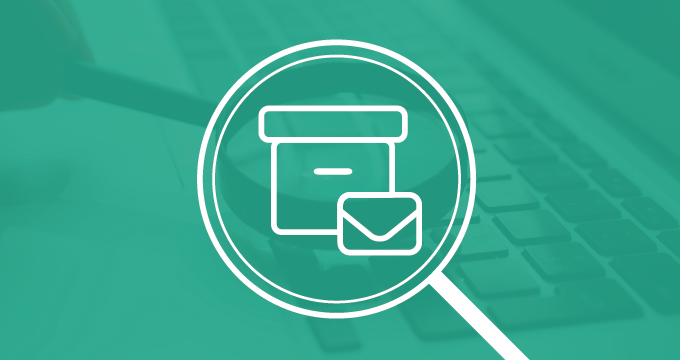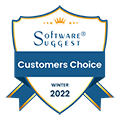In email archiving and ediscovery, search is the functionality you’ll be using on a daily basis, which is why you need it to be powerful, fast and precise and contain various search options. This article zooms on several search-related features you should explore and test when evaluating your next email archiver and when collecting data for ediscovery cases.
Why UI and search options matter
In the early days of email archiving, solutions were built for the select few – the only people using them were administrators and compliance officers. Today, email archiving systems are used not only in times of audits and ediscovery requests, but also as everyday business productivity tools. This means that end users have gained access – they can access their own information and search and manipulate their mailboxes. That’s why it’s crucial for your email archiving software to be fast, simple to use and have an intuitive interface that allows effortless archiving for both admins and end users. But apart from simplicity and user-centered design, the archiving software needs to possess sophisticated features that will allow users to locate and retrieve files easily.
Apart from simplicity and user-centered design, a good #email archiving solution needs to have sophisticated search features that will allow users to locate and retrieve files easily. #EmailArchiving #Ediscovery Share on XLooking for an elusive email message in tens of millions of emails scattered in individual mailboxes and PST files can often feel like looking for a needle in a haystack. In the worst case scenario, your organization will receive an ediscovery request and a very limited time to produce some potentially incriminating emails. Without an email archiving solution, it can cost you as much as $18,000 to review a single gigabyte of data. A powerful search feature will allow you to locate a specific email in a matter of seconds and save you thousands of dollars.
Search types
Email archiving software typically comes with two types of search. Quick search is built for staff members with basic permissions, i.e. end users, and it allows them to perform simple searches through their own mailbox on a daily basis. Advanced search is designed for compliance officers and administrators to conduct more complex, demanding and extensive searches, and browse and manage millions of email messages. It lets admins structure the search better and leaves them with a manageable number of results even when searching through terabytes of data. We can safely say that to prove compliance, meet strict ediscovery and audit request deadlines, the precision of the advanced search is crucial.
The precision of the advanced search is crucial to prove compliance and meet strict #ediscovery and information request deadlines. #EmailArchiving #Email Share on XBoolean search operators
Boolean search is a type of search that allows users to combine keywords with operators (or modifiers) such as AND and OR to produce more relevant results. For example, a Boolean search that says “hotel” AND “New York” would return only those emails containing the two keywords.
Wildcard searches
Searching for keywords you’re sure about is easy. More often than not, you will be searching for non-exact results, which is why most email archiving solutions give you the option to use the wildcard characters. Typing something like inform* into the search bar will retrieve all emails and attachments containing not only the verb inform, but also all words inflected and derived from it – informed, informing, information, informant, informative, misinform etc.
Alternatively, you could use the ? sign as a wildcard that can replace any character in a given search term. This is especially useful if there are both American and British English speakers in your organization and you need to include variant spellings into your query. This type of wildcard search will let you include both spellings into your search, e.g “favo?rite” will search for both “favorite” and “favourite”, while “licen?e” will look for “license” and “licence”.
Fuzzy logic
Email archiving solutions with fuzzy logic will find matches even when the keywords have been misspelled or only hint at a concept. In other words, this type of search can compensate for common typing errors and find synonyms and related terms. Fuzzy searching is much more powerful than exact searching when used for research and investigation and is especially useful when researching unfamiliar or foreign language terms.
Proximity Search
Proximity search lets you locate emails based on how close two or more search terms appear to each other in text. This is useful when you’re looking for concepts and phrases that can be expressed in several ways. For instance, both “the grand opening of a New York hotel” and “the hotel recently opened in New York” would be retrieved if proximity search was used with a slop value (the distance between search terms) of 4.
Search through attachments
A good archiving solution will be able to search not only based on standard email header criteria, but also by attachment, conversation, message size and attachment size. Many existing solutions do a pretty good job of indexing the email header criteria and message bodies, but very few can index and search through attachments. Evidence often hides in the attached documentation, so it’s wise to look for a high-quality email archiving tool that can search through attachments, even when they are zipped.
Search within a search
After conducting a search, some email archiving solutions let you do a subsearch and filter the obtained search results. This is convenient when you search through large volumes of emails and need to narrow down your query.
Saved Searches
After creating a search, compliance officers should be able to save it for future reference and share it with other users. This is especially useful is if the search is complex and needs to be re-run periodically or when there are two COs working on a shared project.
Outlook plugin
Having an Outlook plugin allows users to access, search and manage the email archive directly from their Outlook client without having to log into the web interface of the email archiving solution. This is useful for end users, especially elderly and non-technical personnel who are used to working in a particular UI environment and whose productivity would suffer if they had to change the system.
Does your current email archiving solution tick all these boxes? Jatheon is a global leader in email, social media and mobile communications archiving and ediscovery with 15 years of experience with on-premise archiving and a new, latest-generation cloud email archiving solution with revolutionary advanced search. To learn how Jatheon can help you choose and implement the right archiving solution for your business, contact us or schedule a personal demo.
Read Next:Social Media Ediscovery: Key Challenges and How to Overcome Them How to Prepare for Ediscovery with Email Archiving Email Archiving and Ediscovery: Why You Need Full Audit Trails |








